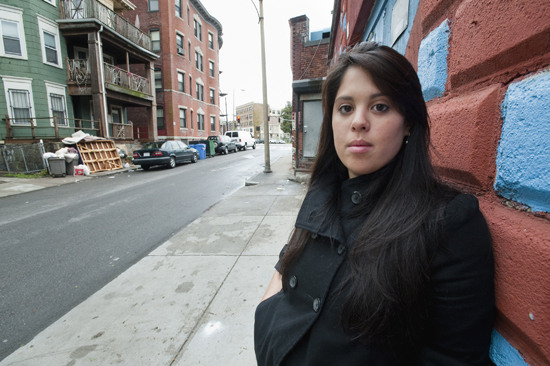In the Trenches with Project Health
Why good care is more than visiting the doctor

When Amanda Frank volunteered to do a little patient outreach, she couldn’t help reaching farther.
As families came into Boston Medical Center for treatment, Frank (SAR’10) was asked to step in to see if they needed help with heating bills, food stamps, child care. Her first patient needed them all — as well as work. Frank decided to let the patient take her part-time job.
“She was in dire need of help,” Frank says. “She was living on less than $100 a month. I was also a home health aid, and my employer was always looking for more help. I was going home for the holiday, and I thought, ‘Well, let her take my job.’”
Frank is a volunteer with Project Health, a national outreach program that places undergraduates in inner-city health clinics to help patients access essential resources such as housing or assistance with utility bills.
Their work allows medical teams and social workers to focus on more complex issues, like substance abuse, mental health, and domestic abuse, although environmental factors remain a key element.
“You can’t prescribe antibiotics for an ear infection and expect good results if the family is living in a car,” says Sutton Kiplinger, executive director of Project Health, Boston. “Medicine can only do so much.”
Approximately 25 Boston University undergraduates volunteer with Project Health for a minimum of six hours a week. In the spring 2009 semester, there were 75 applications for just 10 open volunteer positions.
“The student interest at BU has been incredible,” says Kiplinger. “We’ve been able to get a strong volunteer corps specifically positioned for the patient population.”
Such interest encouraged Project Health to expand its presence in Boston in 2008; Frank was chosen to run a second patient outreach program, at the Upham’s Corner Health Center in Dorchester. She now leads a team of eight multilingual volunteer undergraduates; Frank speaks Spanish and “a few Chinese dialects,” she says.
“It’s a very intimate setting for volunteers to get in contact with their clients,” Frank says. “Upham’s Corner is overwhelmed with the number of clients they have and we’re there to relieve them — to some extent.”
In the difficult economy, demand for Project Health’s services is rising. Since January 2009, the number of families being served has remained constant, but each family is facing three or four issues instead of one or two, says Kiplinger.
Despite myriad problems, volunteers aren’t interested in short-term fixes, Frank says. “A big part of Project Health is to empower people to lift themselves out of the devastation they’re in and to tell them, ‘We didn’t fix your problems. We helped you fix your problems.’”
The addition, in 2008, of an office at Sargent College of Health and Rehabilitation Sciences, where students can make private calls to patients and public service agencies, has helped volunteers foster long-term relationships with their clients.
“I had one client who said, ‘Are you just going to take my number and never call me again?’” Frank remembers. “I think when they see our dedication, they get more motivated.”
Students also use the on-campus space to unwind. Mandatory reflection sessions give volunteers a chance to discuss cases and put issues in perspective. For Sarah Hodge (SAR’12), a volunteer at the BMC site, a Sargent office reflection session was instrumental in helping her reconcile her disappointment and worry about a client whose phone had been disconnected and who was not responding to letters. But it also gave her a chance to share a positive experience: a young father she helped register for General Educational Development (GED) classes at Roxbury Community College subsequently passed the first of five GED test sections.
The patients aren’t the only ones reaping life-changing benefits, according to Jean Peteet, a SAR clinical assistant professor. “Project Health gives students real-life experiences,” she says. “They understand what it’s like for someone who has MassHealth insurance to access services, and they gain communication skills with people of many different ethnic backgrounds.”
As she prepares for a career as a nurse practitioner, Frank says Project Health “changed my entire outlook on medicine. A lot of us go into medicine to help people, but I don’t think students tend to look at the career with a holistic view. I can honestly say I never really thought of the other factors that go into health care and maintaining a healthy lifestyle.”
Andrew Thurston can be reached at thurston@bu.edu.
A version of this article first appeared in the 2009-2010 issue of Inside Sargent.
Comments & Discussion
Boston University moderates comments to facilitate an informed, substantive, civil conversation. Abusive, profane, self-promotional, misleading, incoherent or off-topic comments will be rejected. Moderators are staffed during regular business hours (EST) and can only accept comments written in English. Statistics or facts must include a citation or a link to the citation.